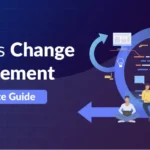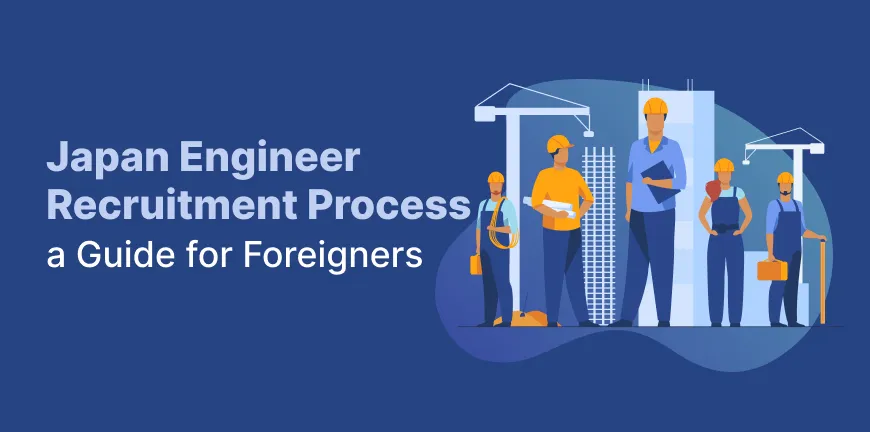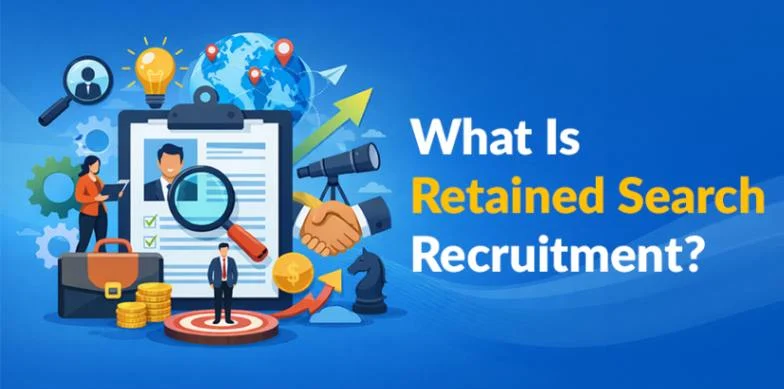
What Is Competency Mapping? Methods and Why It Matters in 2026
27/10/2025
What Is Change Management? Definition, Benefits, And Principles
27/10/2025- Overview of Japan’s Engineering Job Market and Rise in Demand for Foreign Talent
- Japan Engineer Recruitment Process: How It Works?
- 7 Key Steps Followed in the Japan Engineer Recruitment Process
- What are the Challenges Faced by Foreign Engineers in Japan?
- Most In-Demand Engineering Roles in Japan
- 5 Tips for Foreign Engineers to Succeed in the Japanese Job Market
- Why Partner with Us for Japan Engineer Roles?
- Future Trends in Japan’s Engineer Recruitment
- Key Takeaways
- FAQs (Frequently Asked Questions)
Japan’s engineering sector is currently experiencing a chronic demographic crunch, resulting in a critical need for an additional one million foreign workers by 2040 and an immediate shortfall of over 2 lakh IT engineering professionals. This unprecedented talent scarcity, especially in niche fields like AI and embedded systems, has created vast opportunities for overseas engineering professionals.
This guide provides a comprehensive overview for foreign engineering candidates, detailing the structured, skill-driven Japan engineer recruitment process, from technical assessment and visa formalities to essential cultural integration steps.
Overview of Japan’s Engineering Job Market and Rise in Demand for Foreign Talent
Japan’s engineering job market is experiencing a dramatic shift, driven by a sweeping demographic crunch, labour shortage, declining birth rates, and a strategic push for innovation. The number of foreign workers in Japan hit a record high of 2.3 million in 2024-2025, with projected rates set to increase by 12% every year.
However, the Japan International Cooperation Agency (JICA) projects that the country will require an additional one million foreign workers by 2040 to maintain its targeted growth path.
Moreover, in the engineering and technology domain, the Ministry of Economy, Trade, and Industry (METI) estimates a shortfall of about 220,000 IT professionals by the end of 2025, with similar shortages in engineering and product-design roles.
Additionally, Japan requires nearly 2.5 lakhs of AI and data engineers every year to meet the growing demands. Fulfilling such large requirements through local talent is not possible, and hence Japan is looking for overseas professionals in large numbers, especially from India, to compensate for the talent scarcity and stay competitive in the global market.
Here are 5 key reasons that have triggered a huge demand for foreign talent in Japan’s engineering sector:
- A rapidly ageing domestic workforce is leading to a thin pipeline of young Japanese engineers for various sectors.
- Japan’s digital transformation and ‘Industry 4.0’ push require skill sets (AI, embedded systems) which is in short supply locally.
- Domestic engineering graduates are declining in roles in traditional firms, prompting firms to look globally for non-IT engineering talent, especially from India.
- Many Japanese companies are seeking foreign professionals with niche skills like AI, cybersecurity, blockchain, etc., which are not adequately available domestically.
- Government policy and corporate sentiment strongly favour hiring specialised foreign engineers to sustain innovation and global competitiveness.
To facilitate seamless onboarding of foreign professionals, the Japanese engineer recruitment process and visa approvals have been streamlined to a large extent by companies and the government, respectively.
Japan Engineer Recruitment Process: How It Works?
Japan’s engineer recruitment process is developed on a structured & skill-driven approach, combining both technical evaluation and cultural fit, paired with bilingual language proficiency. Unlike other developed countries that prioritize quick hiring cycles, Japanese companies focus on long-term employment & talent integration.
Employers across Japan, regardless of size and industry type, seek engineering candidates with strong technical expertise, adaptability to work culture, and a willingness to commit to the long run. Proficiency in English and Japanese can enhance hiring prospects, especially in global companies.
Many firms collaborate with recruitment agencies like Alp Consulting to source foreign talent, especially Indians, efficiently. Additionally, government-backed programs support companies in hiring skilled foreign engineers to address talent gaps for the immediate and long term. This process ensures that engineering candidates are carefully matched to roles aligned with both skill requirements & organizational values.
Here is a small overview of the Japan Engineer Recruitment Process flow:
- Companies define role requirements and skill needs before initiating the engineering recruitment process.
- Japanese Employers source qualified foreign engineers through agencies, job portals, & international talent networks.
- Resumes are screened either through ATS or traditional methods to shortlist overseas candidates based on technical skills, certifications, and experience.
- Candidates attend interviews, technical assessments, & cultural fit evaluations to ensure alignment.
- Selected foreign candidates receive official offer letters & begin the required documentation processes.
- Employers initiate a visa application and complete all legal and immigration formalities.
- New hires undergo onboarding, orientation, and training for smooth workplace integration.
7 Key Steps Followed in the Japan Engineer Recruitment Process
Here are 7 key steps followed diligently in the Japan Engineer Recruitment Process
1. Companies Define Role Requirements
The Japanese engineer recruitment process begins with employers identifying the exact skills, qualifications, and experience required for the engineering role. This involves mapping technical competencies, language expectations (JLPT N5-N1 level certifications), & cultural adaptability needs. Clear JDs help attract the right foreign talent & ensure alignment between engineering candidate capabilities & the organization’s business vision and goals.
2. Employers Source Qualified Talent
Once requirements are set, Japanese employers use multiple channels like recruitment agencies, job portals, international job fairs, & talent networks to find suitable engineering candidates. Many companies also collaborate with overseas recruitment service providers like Alp Consulting to access specialized engineering talent with Japanese language proficiency, ensuring a wider pool of skilled overseas professionals for critical positions.
3. Resume Screening and Shortlisting
Applications received from prospective foreign engineering candidates are carefully reviewed to evaluate technical expertise, project experience, academic background, & relevant certifications. Only candidates meeting specific role criteria advance to the next stage. This ensures hiring managers focus on applicants with the strongest alignment to job requirements & company objectives.
4. Interviews and Assessments
Shortlisted engineering candidates go through multiple interview rounds, including technical tests, panel discussions, & HR interactions. The focus of this step is on evaluating problem-solving abilities, domain expertise, & cultural fit. Additionally, many companies also assess communication skills, adaptability, & long-term commitment to ensure smooth integration into Japanese workplaces.
5. Job Offer and Documentation
Successful engineering candidates receive formal offer letters outlining job roles, compensation, & benefits. Simultaneously, employers or foreign recruitment agencies like Alp Consulting guide candidates through essential documentation processes, including employment contracts, language certifications, and eligibility paperwork. This step ensures clarity, legal compliance, & a smooth transition toward the onboarding and visa application stages.
6. Visa and Legal Formalities
Employers or foreign recruiting agencies assist selected candidates in obtaining the required work visa by coordinating with immigration authorities. This involves document verification, Certificate of Eligibility (COE) processing, & legal compliance checks. Proper handling of this stage ensures a smooth relocation & timely joining for foreign engineers.
7. Onboarding and Integration
Once in Japan, candidates undergo structured onboarding programs to familiarize themselves with workplace culture, company values, & role expectations. Language support (if needed), cultural orientation, and technical training help ensure a smooth transition, enabling engineers to adapt quickly and contribute effectively to their new roles.
What are the Challenges Faced by Foreign Engineers in Japan?
Here are the 5 common challenges faced by foreign engineers in Japan:
1. Language and Communication Barriers
Despite growing acceptance of English as a primary mode of communication, most workplaces still prefer Japanese. Moreover, overseas engineers, especially from Western nations like the USA and, UK, often struggle with technical documentation, meetings, & daily communication, making language proficiency essential for smooth collaboration, integration, & effective performance within Japanese engineering teams.
2. Cultural Adaptation and Work Etiquette
Japanese workplaces emphasize hierarchy, teamwork, & subtle communication styles. Foreign engineers, especially from Europe and America, may initially find it cumbersome to adapt to relatively long working hours, formal communication norms, & unspoken social expectations, affecting their comfort and long-term engagement within traditional corporate settings.
3. Limited Career Advancement Opportunities
In some organizations, foreign engineers encounter slower promotion cycles or limited access to leadership roles compared to domestic employees. This obstacle often arises due to language barriers, seniority-based systems, or cultural bias toward domestic professionals in decision-making roles.
4. Complex Visa and Bureaucratic Processes
Obtaining & maintaining work visas can be time-consuming, requiring extensive documentation and employer coordination. Foreign engineers must also comply with strict renewal timelines & legal requirements, creating administrative pressure that can impact job security and relocation plans.
5. Social Integration and Work-Life Balance
Adjusting to Japan’s lifestyle, social norms, & limited foreign community interactions can be exasperating. Engineers often face isolation outside work, compounded by demanding schedules, leading to challenges in building personal connections & maintaining a balanced lifestyle abroad.
Most In-Demand Engineering Roles in Japan
Here are the 10 most in-demand engineering roles in Japan:
1. Mechanical Engineers
Design and develop machinery, industrial systems, and automotive components to support Japan’s advanced manufacturing & robotics industries.
2. Electrical Engineers
Work on power systems, automation, and energy-efficient technologies critical to Japan’s renewable energy and industrial modernization goals.
3. Civil Engineers
Plan, design, and manage infrastructure projects such as roads, bridges, and urban development across Japan’s growing smart cities.
4. Software Engineers
Develop applications, embedded systems, and digital solutions supporting Japan’s rapid expansion in AI, IoT, and automation sectors.
5. Automotive Engineers
Contribute to vehicle design, electric mobility, and autonomous systems, driving innovation in Japan’s global automotive industry.
6. Electronics Engineers
Create and optimize semiconductor devices, consumer electronics, and communication systems central to Japan’s technological dominance.
7. Robotics Engineers
Design, program, and maintain industrial and service robots powering Japan’s automation revolution across manufacturing and healthcare.
8. Chemical Engineers
Work on material synthesis, sustainable manufacturing, and energy efficiency innovations in Japan’s chemical and environmental industries.
9. Industrial Engineers
Improve operational efficiency, production workflows, & quality management across factories and industrial facilities throughout Japan.
10. AI & Data Engineers
Build artificial intelligence systems, data models, & predictive tools supporting Japan’s digital transformation and smart industry initiatives.
5 Tips for Foreign Engineers to Succeed in the Japanese Job Market
1. Learn Japanese Language and Culture
Fluency in Japanese and understanding workplace etiquette greatly improve communication, teamwork, and career growth. Cultural acquaintance helps engineers build trust, navigate hierarchical systems, and integrate seamlessly into Japan’s professional & social environments.
2. Obtain Relevant Technical Certifications
Acquiring globally recognized certifications in areas like AI, robotics, or project management boosts credibility. Most Japanese employers value specialized technical expertise supported by professional qualifications that demonstrate both competence & commitment to long-term growth.
3. Network with Industry Professionals
Building connections via professional events, LinkedIn, or engineering associations opens new job opportunities. Additionally, networking helps foreign engineers gain market insights, discover emerging roles, & foster professional relationships crucial for advancement in Japan’s competitive job landscape.
4. Embrace Continuous Learning and Skill Upgradation
Japan’s technology sector evolves rapidly; staying updated with new tools, programming languages, & design systems ensures career longevity. Continuous learning demonstrates adaptability, which is one of the most valued traits among Japanese employers seeking global-minded engineers.
5. Choose Culturally Inclusive Employers
Target multinational or globally focused Japanese firms to foster inclusive work environments. These companies offer better support for foreign engineers, flexible communication styles, structured training programs, & career pathing that encourage innovation & cross-cultural collaboration.
Why Partner with Us for Japan Engineer Roles?
Partnering with Alp Consulting offers Japanese companies a strategic advantage in sourcing highly skilled Indian engineers for critical roles. With nearly 3 decades of experience in global talent acquisition, Alp specializes in connecting Japan’s leading industries with qualified professionals across mechanical, electrical, software, & automotive engineering domains.
Our deep understanding of both Indian and Japanese markets ensures smooth cross-border hiring, visa assistance, and cultural alignment. We manage the entire recruitment cycle that mimics the Japan engineer recruitment process, from candidate screening and technical evaluation to language & cultural training, and relocation, ensuring faster, compliant, & high-quality hiring.
By partnering with us, Japanese employers gain access to a reliable talent pipeline of technically proficient, Japanese language and culturally trained engineers who bring innovation, efficiency, & global perspectives to strengthen Japan’s growing industrial & digital transformation ecosystem.
Future Trends in Japan’s Engineer Recruitment
- Many Japanese companies are actively increasing foreign engineer hiring, with a requirement of AI and data engineers of nearly 2.5 lakhs every year.
- Remote- and hybrid-work arrangements are becoming more common for engineering roles, enabling foreign engineers to work from outside Japan while contributing to Japanese firms.
- There is a growing focus on highly skilled visas and immigration paths, which makes engineers with niche expertise and global experience increasingly attractive for Japanese employers.
- Japan’s major push into digital transformation, AI, embedded systems, and cloud technologies is driving strong demand for engineers with advanced, international technical skills.
- Regional and non-Tokyo companies in Japan are beginning to recruit foreign engineering talent more actively to fill local labour shortages beyond metropolitan hubs.
Key Takeaways
- Japan faces a 2 lakh IT engineer shortage by 2025, creating major opportunities for foreign talent.
- The Japanese engineer recruitment process emphasizes skills, cultural fit, and long-term employment commitment.
- Demand is highest for AI, robotics, embedded systems, and renewable energy engineering professionals.
- Japanese proficiency and adaptability to work culture greatly enhance foreign engineers’ career success.
- Recruitment agencies like Alp Consulting simplify sourcing, documentation, and visa processing for global engineers.
FAQs (Frequently Asked Questions)
1. What is the Japanese engineer recruitment process for foreigners?
It involves sourcing, screening, interviews, offer, visa processing, & onboarding with cultural orientation for smooth integration.
2. Do I need to speak Japanese to get an engineering job in Japan?
Not always required; English-friendly global companies hire foreigners, but Japanese language proficiency improves communication and career growth.
3. What are the top industries hiring foreign engineers in Japan?
Automotive, IT, manufacturing, robotics, electronics, construction, renewable energy, & telecommunications industries actively recruit skilled foreign engineers.
4. How long does the Japan recruitment process take?
Typically, 1–3 months, depending on company size, visa processing, technical assessments, & candidate availability for interviews.
5. What visa is required for engineers in Japan?
Foreign engineers usually require the “Engineer/Specialist in Humanities/International Services” work visa for professional employment.
6. How can a recruitment agency help me find a job in Japan?
Top-rated agencies such as Alp Consulting match candidates with employers, handle documentation, offer interview guidance, provide language & cultural training, & assist with visa and relocation support.

Amit Saproo
Amit Saproo is the Head of Operations at ALP Consulting with nearly 17 years of experience in Executive Search, RPO, Leadership, and IT & Engineering recruitment. He leads nationwide recruitment programs across Technology, BFSI, and R&D domains, driving strategic hiring solutions for diverse client needs. Amit excels in building and managing high-performance teams that deliver scalable, end-to-end recruitment and consulting services.




